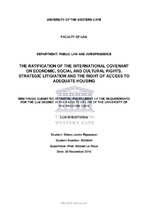The ratification of the international covenant on economic, social and cultural rights, strategic litigation and the right of access to adequate housing
Abstract
Access to adequate housing is an important socio-economic right and is of central importance for the enjoyment of all rights. The right to access adequate housing is viewed as a fundamental human right and has been described in both International Law and by the South African courts as being essential to the dignity of human beings. Access to adequate housing thus plays an important part in ensuring human dignity for all persons. It is also one of the key elements needed to ensure that all persons have access to an adequate standard of living.
Access to adequate housing further plays a vital role in maintaining and improving the lives of all people as it provides both security and shelter. In modern day South Africa, access to adequate housing is held in very high regard. This is evident in the recognition it has received in the National Development Plan as two of the fourteen outcomes of the plan are to ensure that “all people are and feel safe” and “sustainable human settlements and improved quality of household life.”
The drafters of the South African Constitution recognised the importance of access to adequate housing as provision was made for the right to access adequate housing in the Final Constitution in section 26.
In considering the report submitted by South Africa, the United Nations Committee on Economic, Social and Cultural rights indicated (hereinafter referred to as the “Committee on ESCR”) the housing landscape in South Africa continues to be divided as a result of the past and that the apartheid spatial divide continues to dominate the landscape. Viljoen notes that despite numerous attempts to transform the housing regime from one which was grossly discriminatory to a welfare-orientated legal system that functions under the auspices of the rights and values entrenched in the Constitution of the Republic of South Africa the poorest households in South Africa remain subject to not only a lack of access to housing but also intolerable housing conditions. He writes further that the judicial enforcement of the right to access adequate housing is a difficult, complex and multi-layered issue with which the courts have been grappling for some time.
An examination of the housing rights jurisprudence reveals that housing rights and access to adequate housing has been one of the most fiercely contested and frequently litigated topics in the country. The jurisprudence also shows that housing is an area where much legislative, policy and infrastructure progress has been made.

